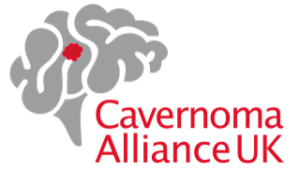Pregnancy
Pregnancy with a cavernoma can understandably raise questions and concerns, especially given how rare the condition is. Research shows that pregnancy does not increase the risk of a cavernoma bleeding, including during childbirth and the postpartum period. This guide brings together clear information and resources to help you make informed decisions, understand genetic considerations, manage any related symptoms such as epilepsy, and find support from others with lived experience.
If you have a cavernoma and are pregnant or planning to become pregnant, it’s natural to have questions about how your cavernoma will impact pregnancy.
Research indicates that pregnancy does not increase the risk of a cavernoma bleeding. This applies to both brain and spinal cavernomas, during pregnancy, childbirth, and the six weeks after birth (the postpartum period).
The method of delivery – whether vaginal or caesarean – should be based on standard obstetric considerations, not solely on the presence of a cavernoma.
However, every individual’s situation is unique. If you have concerns, especially if you’ve experienced symptoms like seizures or previous bleeds, consult your neurologist, neurosurgeon, or obstetrician.
Common questions
Will my child inherit a cavernoma?
Most people with a single cavernoma do not have a genetic form of the condition, so the risk of passing it on is low. If you or close family members have multiple cavernomas, there may be a genetic link. In such cases, there’s a 50% chance of passing the gene to your child. Genetic testing can determine if you carry a cavernoma-related gene (CCM1, CCM2, or CCM3). This involves a simple blood test. A genetic counsellor can guide you through the process and discuss your options.
Can you prevent a child from inheriting cavernoma?
If you have the genetic form of cavernoma, you can stop it being passed on through a process called Pre-implantation Genetic Testing for Monogenic disorders (PGT-M). This involves IVF treatment, where embryos are tested for the cavernoma gene, and only those without the gene are implanted. In England, PGT-M is available on the NHS for certain genetic conditions, including CCM1, CCM2 and CCM3. To access PGT-M, you need a referral to a Clinical Genetics Service, which can be arranged through your GP, neurologist, or neurosurgeon. The process can take several months, so early consultation is advisable.
Is MRI safe during pregnancy?
MRI scans are generally safe during pregnancy, as they do not use radiation. However, the use of contrast agents like gadolinium is usually avoided unless absolutely necessary. If your doctor recommends an MRI, they will discuss the reasons and any potential risks with you.
What if my cavernoma bleeds during pregnancy?
While rare, if a cavernoma bleeds during pregnancy, treatment options are available. In some cases, neurosurgery may be necessary. Surgery during pregnancy carries risks, but it can be performed safely when needed. If surgery can be delayed until after delivery, your medical team will discuss the best plan for you and your baby.
Does this advice apply to spinal cavernoma?
The risk of bleeding from spinal cord cavernomas during pregnancy is similar to that of brain cavernomas. The presence of a spinal cavernoma might raise questions your obstetric anaesthetist would wish to discuss with your neurosurgeon, but in most cases is not an absolute contraindication to epidural use.
Managing epilepsy
If you have epilepsy due to a cavernoma, pregnancy requires careful management:
- Medication: Some anti-seizure medications can affect the baby’s development. Do not stop taking your medication without medical advice. Consult your neurologist to adjust your treatment safely.
- Folic Acid: Take a higher dose of folic acid (5mg daily) before conception and during early pregnancy to reduce the risk of birth defects.
- Monitoring: Regular check-ups with your healthcare team will help manage your condition and monitor your baby’s development.
For more information, visit the NHS guidance on epilepsy and pregnancy.
In this webinar, Professor Catherine Nelson-Piercy, Consultant Obstetric Physician, discusses cavernoma and pregnancy, including epilepsy management. Please note this recording is from 2021, and the CCM Care Guidelines mentioned have since been replaced by the 2025 version available here.
Further information
You can learn more about cavernoma and pregnancy in the following research papers, which explore bleeding risk and related considerations.
We understand that going through pregnancy with cavernoma can feel daunting, even when your clinicians are reassuring. Many people find it helpful to connect with others who have experienced pregnancy with cavernoma through our closed Facebook group, or to be buddied with someone who has shared a similar journey. You can find more information about buddying for UK residents here.
